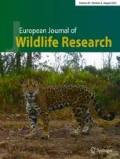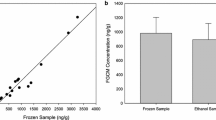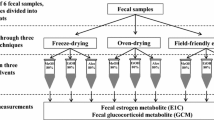Abstract
Faecal cortisol metabolite (FCM) analysis is a reliable non-invasive method used in field endocrinology studies to assess levels of stress in animals. It is known that weather and, above all, humidity, can affect FCM concentrations in faecal samples. In addition, the prolonged storage of samples and delay in their analysis may alter metabolite concentrations. Intrinsic factors such as the heterogeneous distribution of FCMs within scats may likewise cause intra-sample variation. All of these sources of variation in FCM concentrations need to be addressed if we are to interpret results correctly. The aim of this study was to assess the effects of lyophilisation and storage temperature on the long-term stability of 11-oxoaetiocholanolone (11-o) in red deer (Cervus elaphus) faecal samples. After pre-cleaning with hexane and extraction with methanol, 11-o levels were analysed using high-performance liquid chromatography coupled with tandem mass spectrometry HPLC-MS/MS at 1, 2, 4, 6, 8, 16 and 32 weeks post-collection. We used linear mixed models to explore the effects of temperature and storage time on concentrations of faecal 11-o in wet and dry samples. Our results showed significant variations in 11-o concentrations in wet faecal samples over time and at different storage temperatures. By contrast, the 11-o values of dry samples were more stable in terms of storage temperatures. Lyophilising red deer faecal samples and storage at − 80 °C guarantees the stability of 11-o for several months.

Similar content being viewed by others
References
Azorit C, Castro JM, Carrasco R, Tellado S, Orpez R, Moro J (2012) Faecal 11-ketoetiocholanolone measurement in Iberian red deer (Cervus elaphus hispanicus): validation of methodology using HPLC-MS/MS. Anim Prod Sci 52:756–760. https://doi.org/10.1071/AN12022
Bahr NI, Palme R, Möhle U, Hodges JK, Heistermann M (2000) Comparative aspects of the metabolism and excretion of cortisol in three individual nonhuman primates. Gen Comp Endocrinol 117:427–438. https://doi.org/10.1006/gcen.1999.7431
Dalmau A, Ferret A, Chacon G, Manteca X (2007) Seasonal changes in fecal cortisol metabolites in Pyrenean chamois. J Wildll Manage 71:190-194. DOI: 10.2193.2005–2492
De Clercq N, Vanden Bussche J, Croubels S, Delahaut P, Vanhaecke L (2014) Development and validation of a high-resolution mass-spectrometry–based method to study the long-term stability of natural and synthetic glucocorticoids in faeces. J Chromatograph A 1336:76–86. https://doi.org/10.1016/j.chroma.2014.02.033
Dehnhard M, Clauss M, Lechner-Doll M, Meyer HH, Palme R (2001) Non-invasive monitoring of adrenocortical activity in roe deer (Capreolus capreolus) by measuring fecal cortisol metabolites. Gen Comp Endocrinol 123:111–120. https://doi.org/10.1006/gcen.2001.7656
Descovich KA, Lisle AT, Johnston S, Keeley T, Phillips CJ (2012) Intrasample variation and the effect of storage delay on faecal metabolite concentrations in the southern hairy-nosed wombat (Lasiorhinus latifrons). Aust Mammal 34:217–222. https://doi.org/10.1071/AM11047
Edmonds JS, Morita M, Turner P, Skelton BW, White AH (2006) Aerial oxidation of the glucocorticoid side-chain under pH control. Steroids 71:34–41. https://doi.org/10.1016/j.steroids.2005.08.003
Gholib G, Heistermann M, Agil M, Supriatna I, Purwantara B, Nugraha TP, Engelhardt A (2018) Comparison of fecal preservation and extraction methods for steroid hormone metabolite analysis in wild crested macaques. Primates 59:281–292. https://doi.org/10.1007/s10329-018-0653-z
Hadinger U, Haymerle A, Knauer F, Schwarzenberger F, Walzer C (2015) Faecal cortisol metabolites to assess stress in wildlife: evaluation of a field method in free-ranging chamois. Methods Ecol Evol 6:1349–1357. https://doi.org/10.1111/2041-210X.12422
Herring G, Gawlik DE (2009) Stability of avian fecal corticosterone metabolite levels in frozen avian feces. J Wildl Manag 73:1010–1013. https://doi.org/10.2193/2008-398
Hothorn T, Bretz F, Westfall P (2008) Simultaneous inference in general parametric models. Biom J 50:346–363. https://doi.org/10.1002/bimj.200810425
Huber S, Palme R, Arnold W (2003) Effects of season, sex, and sample collection on concentrations of fecal cortisol metabolites in red deer (Cervus elaphus). Gen Comp Endocrinol 130:48–54. https://doi.org/10.1016/S0016-6480(02)00535-X
Keay JM, Singh J, Gaunt MC, Kaur T (2006) Faecal glucocorticoids and their metabolites as indicators of stress in various mammalian species: a literature review. J Zoo Wildl Med 37:234–244. https://doi.org/10.1638/05-050.1
Khan MZ, Altmann J, Isani SS, Yu J (2002) A matter of time: evaluating the storage of fecal samples for steroid analysis. Gen Comp Endocrinol 128:57–64. https://doi.org/10.1016/S0016-6480(02)00063-1
Konjević D, Janicki Z, Slavica A, Severin K, Krapinec K, Božić F, Palme R (2011) Non-invasive monitoring of adrenocortical activity in free-ranging fallow deer (Dama dama L.). Eur J Wildl Res 57:77–81. https://doi.org/10.1007/s10344-010-0401-1
Lexen E, El-Bahr SM, Sommerfeld-Stur I, Palme R, Möstl E (2008) Monitoring the adrenocortical response to disturbances in sheep by measuring glucocorticoid metabolites in the faeces. Wien Tierärztl Mschr 95:64–71
McCullagh P, Nelder JA (1989) Generalized linear models. Chapman and Hall, London – New York
Millspaugh JJ, Washburn BE (2003) Within-sample variation of fecal glucocorticoid measurements. Gen Comp Endocrinol 132:21–26. https://doi.org/10.1016/S0016-6480(03)00061-3
Millspaugh JJ, Washburn BE, Milanick MA, Slotow R, van Dyk G (2003) Effects of heat and chemical treatments on fecal glucocorticoid measurements: implications for sample transport. Wildl Soc Bull 31:399–406. https://doi.org/10.2307/3784319
Molina-García L, Pérez JM, Sarasa M, Ureña-Gutiérrez B, Espinosa J, Azorit C (2018) HPLC-QTOF method for quantifying 11-ketoetiocholanolone, a cortisol metabolite, in ruminants’ feces: optimization and validation. Ecol Evol 8:9218–9228. https://doi.org/10.1002/ece3.4285
Möstl E, Messmann S, Bagu E, Robia C, Palme R (1999) Measurement of glucocorticoid metabolite concentrations in faeces of domestic livestock. J Vet Med 46:621–631
Palme R (2019) Non-invasive measurement of glucocorticoids: advances and problems. Physiol Behav 199:229–243. https://doi.org/10.1016/j.physbeh.2018.11.021
Palme R, Möstl E (1997) Measurement of cortisol metabolites in faeces of sheep as a parameter of cortisol concentration in blood. Int J Mammal Biol 62 (Suppl. II):192-197
Palme R, Robia C, Messmann S, Hofer J, Möstl E (1999) Measurement of faecal cortisol metabolites in ruminants: a non-invasive parameter of adrenocortical function. Wien Tierärztl Mschr 86:237–241
Palme R, Touma C, Arias N, Dominchin MF, Lepschy M (2013) Steroid extraction: get the best out of faecal samples. Wien Tierärztl Mschr 100:238–246
Parnell T, Narayan EJ, Nicolson V, Martin-Vegue P, Mucci A, Hero JM (2015) Maximizing the reliability of non-invasive endocrine sampling in the tiger (Panthera tigris): environmental decay and intra-sample variation in faecal glucocorticoid metabolites. Conserv Physiol 3. https://doi.org/10.1093/conphys/cov053
Pauli JN, Whiteman JP, Riley MD, Middleton AD (2009) Defining noninvasive approaches for sampling of vertebrates. Conserv Biol 24:349–352. https://doi.org/10.1111/j.1523-1739.2009.01298.x
Pérez JM, Molina L, Ureña-Gutiérrez B, Espinosa J, López-Montoya AJ, Boos M, Granados JE, Cano-Manuel FJ, Azorit C (2019) Individual stress responses to Sarcoptes scabiei infestation in Iberian ibex, Capra pyrenaica. Gen Comp Endocrinol 281:1–6. https://doi.org/10.1016/j.ygcen.2019.05.007
Pinheiro J, Bates D, DebRoy S, Sarkar D, the R Development Core Team (2013) nlme: linear and nonlinear mixed effects models. R package version 3:1–108
R Development Core Team (2017) R: a language and environment for statistical computing. R Foundation for Statistical Computing, Vienna, Austria. http://www.R-project.org
Terio KA, Brown JL, Moreland R, Munson L (2002) Comparison of different drying and storage methods on quantifiable concentrations of fecal steroids in the cheetah. Zoo Biol 21:215–222. https://doi.org/10.1002/zoo.10036
Touma C, Palme R (2005) Measuring fecal glucocorticoid metabolites in mammals and birds: the importance of validation. Ann N Y Acad Sci 1046:54–74. https://doi.org/10.1196/annals.1343.006
Washburn BE, Millspaugh JJ (2002) Effects of simulated environmental conditions on glucocorticoid metabolite measurements in white-tailed deer feces. Gen Comp Endocrinol 127:217–222. https://doi.org/10.1016/S0016-6480(02)00056-4
Wickham H (2016) ggplot2: elegant graphics for data analysis. Springer-Verlag, New York
Zuur AF, Ieno EN, Walker NJ, Saveliev AA, Smith GM (2009) Mixed effects models and extensions in ecology with R. Springer, New York
Acknowledgements
The technical and human support provided by the Centro de Instrumentación Científico-Técnica of the Universidad de Jaén (funded by MINECO, Junta de Andalucía, FEDER) is gratefully acknowledged.
Funding
This study was funded by the Fédération Nationale des Chasseurs (France) (project: PR4-2013). The research activities of the authors are partially supported by the Junta de Andalucía (RNM-118 and RNM-175 groups).
Author information
Authors and Affiliations
Contributions
JMP, MB and CA conceived and designed the study; JMP and JE obtained the samples used in this study; LM-G analysed the samples; AJLM performed the statistical analysis of the data; all co-authors contributed in the writing of the manuscript and gave their final approval for its publication.
Corresponding author
Ethics declarations
Conflict of interest
The authors declare that they have no conflict of interest.
Additional information
Publisher’s note
Springer Nature remains neutral with regard to jurisdictional claims in published maps and institutional affiliations.
Rights and permissions
About this article
Cite this article
Pérez, J.M., Espinosa, J., Boos, M. et al. Evaluation of long-term 11-oxoaetiocholanolone stability in red deer faecal samples under different storage conditions. Eur J Wildl Res 66, 56 (2020). https://doi.org/10.1007/s10344-020-01399-6
Received:
Revised:
Accepted:
Published:
DOI: https://doi.org/10.1007/s10344-020-01399-6




